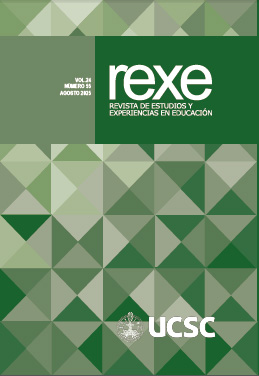School disengagement processes: the phenomenon of school absenteeism from the perspective of school principals
DOI:
https://doi.org/10.21703/rexe.v24i55.2864Keywords:
Absenteeism, Attendance, Principal, Leader, Public schoolAbstract
This article explores the views of public-school principals on the phenomenon of truancy, the causes that influence it, and its main consequences. The methodology was qualitative, with semi-structured interviews conducted with principals in a total of 10 schools in northern, central, and southern Chile. The results show that principals associate the origin of absenteeism with causes related to the home or family, the student, and the neighborhood or community. At school, principals did not identify causes of absenteeism, but rather factors that promote attendance. The consequences of absenteeism were identified in the areas of academics and learning, socio-emotional development, and commitment to school and social integration. The conclusions show that, although principals' views are multi-causal, they tend to attribute the causes of absenteeism to families and do not analyze or delve into the causes within each school that could be causing absenteeism. Furthermore, the consequences of absenteeism are not limited to the academic sphere, making it urgent to adopt more effective local measures and national policies to respond to this phenomenon.
Downloads
References
Ango, T. G., Börjeson, L., Wisborg, P., Senbeta, F., & Alem, H. (2022). Coffee, child labour, and education: Examining a triple social–ecological trade-off in an Afromontane forest landscape. International Journal of Educational Development, 95, 102681-. https://doi.org/10.1016/j.ijedudev.2022.102681
Balkis, M. (2018) Academic amotivation and intention to school dropout: the mediation role of academic achievement and absenteeism, Asia Pacific Journal of Education, 38:2, 257-270, DOI: 10.1080/02188791.2018.1460258
Bender Sebring, P., & Montgomery, N. (2014). The Five Essential Supports for School Improvement: Mobilizing the Findings. Facultad de Filosofía y Ciencias de la Educación de la Pontificia Universidad Católica de Chile.
Bonal, X. (1998) Sociología de la educación Una aproximación crítica a las corrientes contemporáneas. Paidos, Barcelona.
Bourdieu, P., & Passeron, J. Claude. (2003). Los herederos : los estudiantes y la cultura. Siglo Veintiuno.
Centro de Estudios Mineduc. (2023). Reporte nacional de asistencia del primer semestre educativo (marzo-junio) de los años 2018, 2022 y 2023. Centro de Estudios MINEDUC © 2023 Ministerio de Educación
Fernández, Mariano (2011), “Del desapego al desenganche y de éste al fracaso escolar”, Cua-dernos de Pesquisa, vol. 41, núm. 14 4, pp. 732-751, en: http://www.scielo.br/pdf/cp/v41n144
Fullan, Michael (2012). ¿Por qué Chile debiera saber más acerca de sus directores de escuela?. Presentacion. En Weinstein, J. y Muñoz, G. (2020) ¿Qué sabemos sobre los directores de escuela en Chile?. Ceppe, Fundación Chile.
García Gracia, M., & Razeto Pavez, A. (2019). ¿Por qué faltan los jóvenes a la escuela?. Perfiles Educativos, 41(165), 43-61. https://doi.org/10.22201/iisue.24486167e.2019.165.59015
Garcia-Gracia, M., & Valls, O. (2023). School absenteeism, emotional engagement and school organisation: an international comparative approach. International Journal of Inclusive Education, 1–15. https://doi.org/10.1080/13603116.2023.2266722
García, Maribel (2009), “El absentismo escolar: algunas claves para el desarrollo de interven-ciones integradas en el marco de una escuela inclusiva y del territorio”, Monográficos Es-cuela, núm. 5, pp. 4-6.
García, Maribel (2013), Absentismo y abandono escolar, Madrid, Síntesis.
García-Huidobro y Falabella, A. (2013). Diálogos sobre los fines de la educación. En García-Huidobro y Falabella (2013. Los fines de la educación. Seminario sobre gratuidad, lucro, justicia y democracia. Ediciones UC, Santiago. P. 7-16
Gottfried, M (2014). Chronic Absenteeism and Its Effects on Students’ Academic and Socioemotional Outcomes, Journal of Education for Students Placed at Risk (JESPAR), 19:2, 53-75, DOI: 10.1080/10824669.2014.962696
Gottfried, M. A. (2019). Chronic Absenteeism in the Classroom Context: Effects on Achievement. Urban Education, 54(1), 3-34. https://doi.org/10.1177/0042085915618709
Hendron, M., & Kearney, C. A. (2016). School Climate and Student Absenteeism and Internalizing and Externalizing Behavioral Problems. Children & Schools, 38(2), 109–116. https://doi.org/10.1093/cs/cdw009
Hill, D., & Mrug, S. (2015). School-Level Correlates of Adolescent Tobacco, Alcohol, and Marijuana Use. Substance Use & Misuse, 50(12), 1518–1528. https://doi.org/10.3109/10826084.2015.1023449
İlter, İ. (2023). Which Types of Amotivation Affect School Absenteeism and Academic Performance of Middle School Students? A Structural Equation Modeling Analysis. RMLE Online : Research in Middle Level Education, 46(2), 1–20. https://doi.org/10.1080/19404476.2022.2161785
Kim, J., & Gentle‐Genitty, C. (2020). Transformative school–community collaboration as a positive school climate to prevent school absenteeism. Journal of Community Psychology, 48(8), 2678–2691. https://doi.org/10.1002/jcop.22444
Kumar, A., & Saqib, N. (2017). SCHOOL ABSENTEEISM AND CHILD LABOR IN RURAL BANGLADESH. The Journal of Developing Areas, 51(3), 299–316. https://doi.org/10.1353/jda.2017.0074
Langdon, R., Mandel, A., Cameron, M., Pierce, E., McCracken, E., Strelzik, J., McClintock, W., Bost, J., & DiSabella, M. (2022). Pediatric screen exposure and school related headache disability. Cephalalgia, 42(13), 1349–1358. https://doi.org/10.1177/03331024221113468
Liu, J., & Loeb, S. (2021). Engaging Teachers: Measuring the Impact of Teachers on Student Attendance in Secondary School. The Journal of Human Resources, 56(2), 343–379. https://doi.org/10.3368/jhr.56.2.1216-8430R3
Lynne, K; Peia, W & Menzies. (2023). Using low-intensity strategies to support engagement: practical applications in remote learning environments for teachers and families. Preventing School Failure: Alternative Education for Children and Youth 67(2), 79-82. https://doi.org/10.1080/1045988X.2023.2181300
Martin, A. J., & Collie, R. J. (2019). Teacher-Student Relationships and Students’ Engagement in High School: Does the Number of Negative and Positive Relationships With Teachers Matter? Journal of Educational Psychology, 111(5), 861–876. https://doi.org/10.1037/edu0000317
McDaniel, Justin T.; Henson, Harvey; Box, Angela; Slowick, Celena; Edwards, Tishauna (2020). Socioeconomic and Environmental Determinants of School Truancy in Illinois. Health Behavior and Policy Review, Volume 7, Number 2, March 2020, pp. 102-109(8) DOI: https://doi.org/10.14485/HBPR.7.2.3
Mendoza-Berjano, R., Gómez-Baya, D., Grasmeijer, A. J. ., Lorenzo-Fernández, M., López-Bermúdez, E., & Rubio-González, A. (2024). El absentismo en educación secundaria: prevalencia y perfiles del alumnado incluyendo características del contexto familiar y de la vinculación con el centro. Educación XX1, 27(2), 141–166. https://doi.org/10.5944/educxx1.38573
Mineduc, División General Educación, (2020) .Abordaje del Ausentismo Crónico Teoría y estrategias para su disminución. https://bibliotecadigital.mineduc.cl/bitstream/handle/20.500.12365/16806/Abordaje-del-AC.pdf?sequence=1&isAllowed=y
Miranda-Zapata, E., Lara, L., Navarro, J.-J., Saracostti, M., & de-Toro, X. (2018). Modelling the Effect of School Engagement on Attendance to Classes and School Performance. Revista de Psicodidáctica (English Ed.), 23(2), 102–109. https://doi.org/10.1016/j.psicoe.2018.03.001
Moore, D. (2022). School Attendance: Terminology and Socio-political Considerations. In K. Finning, T. Ford, & D. Moore (Eds.), Mental Health and Attendance at School (pp. 22-37). Cambridge: Cambridge University Press. doi:10.1017/9781911623151.003
Rajaratnam, S. M. W., Licamele, L., & Birznieks, G. (2015). Delayed sleep phase disorder risk is associated with absenteeism and impaired functioning. Sleep Health, 1(2), 121–127. https://doi.org/10.1016/j.sleh.2015.03.001
Razeto Pavez, A., (2020). Hacia la prevención del ausentismo escolar: propuestas para la intervención socioeducativa. Revista Brasileira de Educação, 25( ), . https://doi.org/10.1590/S1413-24782020250037
Seashore, K; Beverly Dretzke & Kyla Wahlstrom (2010) How does leadership affect student achievement? Results from a national US survey, School Effectiveness and School Improvement, 21:3, 315-336, DOI: 10.1080/09243453.2010.486586
Singer, J., Pogodzinski, B., Lenhoff, S. W., & Cook, W. (2021). Advancing an Ecological Approach to Chronic Absenteeism: Evidence from Detroit. Teachers College Record, 123(4), 1-36. https://doi.org/10.1177/016146812112300406
Spillane, J. (2017). Leadership and Learning: Conceptualizing Relations Between School Administrative Practice and Instructional Practice. In: Leithwood, K., Sun, J., Pollock, K. (eds) How School Leaders Contribute to Student Success. Studies in Educational Leadership, vol 23. Springer, Cham. https://doi.org/10.1007/978-3-319-50980-8_4
Stevenson, D., y Baker, D. (1987). The family-school relation and the child's school performance. Child Development, 58, 1348-1357. DOI: 10.1111/j.1467-8624.1987.tb01463.x
Sundelin, Å., Lindgren, J., & Lundahl, L. (2023). Young People’s Stories of School Failure and Remedial Trajectories – Clues to Prevention of School Absenteeism and Early School Leaving. European Education, 55(3/4), 202–215. https://doi-org.pucdechile.idm.oclc.org/10.1080/10564934.2023.2251023
Tarabini, A. (2019). The Conditions for School Success : Examining Educational Exclusion and Dropping Out (1st ed. 2019.). Springer International Publishing. https://doi.org/10.1007/978-3-030-02523-6
Tobías, A. (2019). A grounded theory study of family coach intervention with persistent school non-attenders. Educational Psychology in Practice, 35(1), 17–33. https://doi.org/10.1080/02667363.2018.1518215
Unesco (2022) Informe de seguimiento de la educación en el mundo 2022: informe sobre genero, profundizar en el debate sobre quienes todavía están rezagados. https://doi.org/10.54676/LHMC7003
Downloads
Published
Issue
Section
License
Copyright (c) 2025 Alicia Razeto

This work is licensed under a Creative Commons Attribution 4.0 International License.
Open Access Policy
This journal provides immediate open access to its content, based on the principle that offering the public free access to research fosters greater global knowledge exchange.
License
The REXE Journal, “Journal of Studies and Experiences in Education,” published by the Faculty of Education at the Universidad Católica de la Santísima Concepción, is distributed under a License. Creative Commons Atribución 4.0 Internacional.






